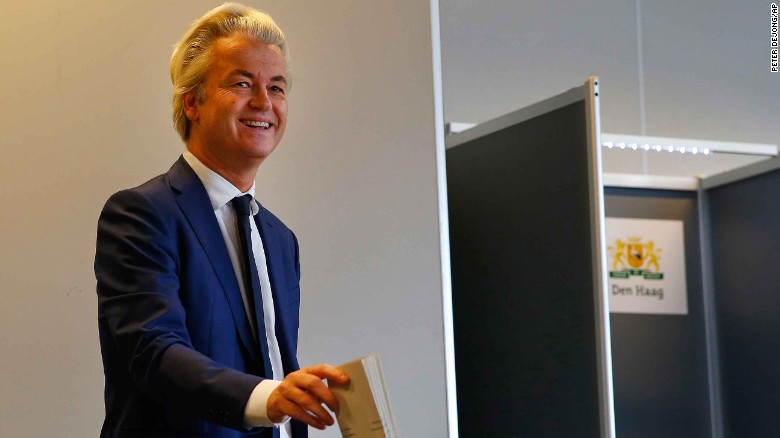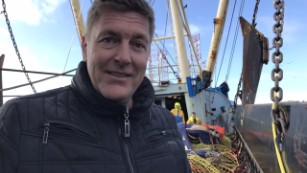
Voters in the Netherlands head to the polls Wednesday in an election widely seen as an indicator of populist sentiment across Europe.
With the first round of the French presidential election just over a month away and Germany headed to the ballot box later this year, the Dutch battle is being closely watched for clues to wider political trends.
Conservative Prime Minister Mark Rutte is facing a tight battle with far-right rival Geert Wilders, whose anti-immigrant, anti-Islam tirades have landed him in court — but also won him widespread support in a country that is increasingly polarized by austerity and immigration issues.
Rutte’s Party for Freedom and Democracy, the VVD, leads the latest Peilingwijzer poll of polls by Leiden University, but Wilders’ Freedom Party, the PVV, is hot on its heels.
The Dutch political landscape is splintered, with 28 parties on the ballot, and the country’s system of proportional representation means some form of coalition government is almost guaranteed.
Poll position but no gold
Rutte will be looking to secure a third term in office; should his lawmakers form the largest group in the 150-seat House of Representatives, he is expected to form a new coalition government with at least three other parties.
But maintaining the status quo is exactly what many Dutch voters have tired of, and Wilders has rated strongly in pre-election polls thanks to his no-nonsense rhetoric and often controversial views. Other parties — including Rutte’s VVD — have lurched to the right in response.
Musician and actor Ron Mesland, from Amsterdam, said he was concerned about the wider impact of Wilders’ popularity: “I’m worried about Geert Wilders, but mostly about the effect he has on the other parties,” he said. “Most other parties seem to adopt his speech and his ideas, and that really worries me.”
Ruud Koole, politics professor at the University of Leiden, said that in the event Wilders secures the most seats in the House of Representatives, the country’s political system would likely make it extremely difficult for him to govern.
“We always have coalition governments,” he said. “If Wilders’ party were to become the biggest … he’ll have to make a coalition with other parties. The problem for Wilders is that other parties do not want to enter a coalition with the PVV.”
Losing steam on final lap?
Koole said Wilders is popular because he speaks to the specific concerns of part of the electorate, “concerns about unemployment, about health care, but especially about the Dutch national identity, which lead to foreigners, immigrants, asylum seekers, also refugees.
“Voters for Wilders don’t really believe that he has the solutions to solve these problems, but at least he expresses their concerns and that is why he polls rather high in this campaign.”
But Wilders’ popularity has waned in recent weeks and one expert suggested his decline could be down to US President Donald Trump.
“[Wilders is] well under 20% and his support has been slipping in the recent weeks,” said Quentin Peel, associate fellow at Chatham House. “I think one of the reasons it’s been slipping, funnily enough, is the election or arrival in power of Donald Trump.”
He continued: “I think that very well-grounded middle-of-the-road solid Dutch citizens have been a bit concerned about what has been happening in Washington.
“The trouble is [the results] are very difficult to predict. You’ve got no less than 28 parties running in this campaign, and you’re probably going to … end up with a very complicated coalition and Mr. Wilders is not going to be part of it.”
Key issues for voters
Given the bellwether nature of Europe’s first election this year, the Netherlands has been thrust into the global spotlight. According to preliminary Eurostat data, the country’s economy grew by 2.1% last year, and investors have remained reasonably calm throughout the campaign.

But Rutte’s tough austerity measures aimed at combating the 2011-2012 recession have hit the country’s poorest the hardest and that has weighed on their minds as they prepare to visit the ballot box.
“My biggest concern is that the working class is being put down,” said delivery driver Tony Regnerus. “The immigrants are all coming in, and they get a better life than the working man.
They’re not pushed to do anything with their life, they’re not pushed to get a job.
“Every day, I go to big cities like Rotterdam and Gouda and Delft, they’re all wearing Canada Goose jackets — €600, and I can’t pay it — [but] I’m a working man. It’s gotta be the other way around.”
The Netherlands’ relationship with the European Union has been another hot topic on the campaign trail. The Dutch were founding members of the union, but attitudes have cooled in recent years, and Wilders has pledged a Brexit-style referendum on whether to leave the EU.
Fisherman Jan de Boer said he is concerned about the future of his industry — which he says is threatened by EU regulations — and this will be at the forefront of his mind when he comes to fill out his ballot on election day.
“The rules are very bad for the fishermen of the Netherlands,” he said. “We want fishing and our children want fishing.”
Until now, de Boer has always voted for the Christian Party — but this time around, he said, that will change. “Geert Wilders’ … is the only party that fights European rules, and for me that’s important.”
But bus company worker Leonard Schaab said he didn’t believe Wilders will do as well as expected: “The polls are always a little bit off, and when the real elections [take place] most of the time people will vote for other parties.”
“The man doesn’t have the skills to do it,” he added. “The only thing Geert Wilders does is shout about all kinds of problems … he creates problems, but he never has solutions.”
As reported by CNN
